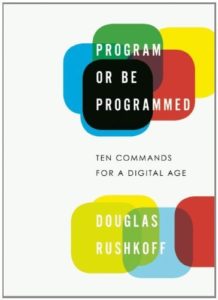Use IT, don’t let IT use you
We are surrounded by and often very dependent on the technology that surrounds us.
But that technology is not Nature, it is not naturally occurring.
Technology has been constructed with an agenda:
- to believe things,
- spend our money on certain things,
- or to connect to select people in certain ways.
When we understand this, then and only then can we make aware choices about how we interact with IT and what our own priority is.
Program or Be Programmed
 Douglas Rushkoff in his book
Douglas Rushkoff in his book
“Program or Be Programmed, Ten Commandments for a digital age”
sheds light on this contemporary set of circumstances.
Without deliberate awareness that what surrounds us is designed to program us for a particular outcome, we cannot choose our own program or outcome for our life.
Our technology fosters
- distraction rather than focus,
- automatic response rather than contemplation first
- and contradiction and opposition as a knee-jerk reaction.
Our nervous systems are being conditioned by our environment, in ways we may not be aware of.
Digital media have a bias, a tendency to promote one set of behaviors over another. Once we are aware of the bias, then we can have choice as to how to balance it with the needs of living in both a natural world and a virtual one.
Time
“The human nervous system exists in the present tense. We live in a continuous “now,” and time is always passing for us. Digital technologies do not exist in time, at all.” – Douglas Rushkoff
 That is quite a contrast and revelation.
That is quite a contrast and revelation.
The internet doesn’t care if we are there or not.
But if we jump at the arrival of each message, looking at an email or text the moment it comes in, we are surrendering our time to a technology that does not know time.
Our devices are often set up to notify us with a buzz or jingle that has conditioned us to respond. That is classical conditioning at its strongest.
When we get intermittent reinforcement, then the behavior gets stronger. In this case, intermittent reinforcement is looking at email after email or text after text and some of them being rewarding, not all of them. Then we continue to check and are willing to wait for that one that is the reward.
Then the habit leaves us frazzled and exhausted.
Take back your power and filter your messages. You can even set your phone for different ring tones for important people. Then you can respond at predetermined times, making your schedule priority.
Place
Our technology is outstanding for connecting us long-distance.
I marvel that I have weekly conversations with a friend in Spain, or can chat with another friend in New Zealand and see summer in the background while I have winter all around.
On the other hand, when used for daily life, it can seem that we are everywhere at once, but are actually nowhere. As a manic compulsive way to keep tabs on everything, we wind up checking texts and then tuning the phone around to take pictures of where we are and who we are with, but not really being with those people.
When we depend on the net for our sense of connection and community, we can get desensitized and disconnected. In addition, if we have become accustomed to digital connection, we might be uncomfortable in real space with real people.
 My experience living at Arcosanti was a wonderful example of the possibilities of community. I could walk out my door, and I never knew who I would run across and have a conversation with. If I was looking for someone, I might go to a workplace, then interact with several other people without even trying. The casualness and immediacy gave a real human perspective to the liveliness possible in a city. The design of the buildings actually facilitated human interaction.
My experience living at Arcosanti was a wonderful example of the possibilities of community. I could walk out my door, and I never knew who I would run across and have a conversation with. If I was looking for someone, I might go to a workplace, then interact with several other people without even trying. The casualness and immediacy gave a real human perspective to the liveliness possible in a city. The design of the buildings actually facilitated human interaction.
Where can you fully engage with others? When can you return to face-to-face conversations for full-spectrum communication?
Identity
“Our digital experiences are out-of-body. This biases us toward depersonalized behavior in an environment where one’s identity can be a liability.” – Douglas Rushkoff
 Being out-of-body, behind a computer can promote the illusion that there are no consequences. The more anonymously people post, the more likely it will get abusive or simply disconnected.
Being out-of-body, behind a computer can promote the illusion that there are no consequences. The more anonymously people post, the more likely it will get abusive or simply disconnected.
The characteristics of immersion in the internet are
- dependence of the verbal over visual,
- less able to read social cues and facial expressions,
- seeming lack of empathy,
- and the inability to make eye contact.
In real life, making eye contact can mean a lot more than what you are saying.
Before writing anything as a post or text, reconnect. Say exactly what you would be proud to see quoted or shared. That can be a way to monitor your level of connection.
The other 7 commandments of Douglas Rushkoff have to do with:
- Choice
- Complexity
- Scale
- Social
- Fact
- Openness
- Purpose
“Programming is the sweet spot, the high leverage point in a digital society. If we don’t learn to program, we risk being programmed ourselves.” – Douglas Rushkoff
When have you recognized that you have been programmed?
When have you recognized that you have taken over the programming?
Please comment below.
WANT TO USE THIS ARTICLE IN YOUR NEWSLETTER OR WEB SITE?
You can, as long as you include this complete blurb with it: “Naturopathic Physician Dr. Cheryl Kasdorf is a doctor who listens and has answers with a natural approach that works. She is known as the go-to person to get back your get-up-and-go when it is gone, gone, gone. Get your FREE gift “Dr. Kasdorf’s Health Secrets for Feeling & Looking Great” at drcherylkasdorf.com





